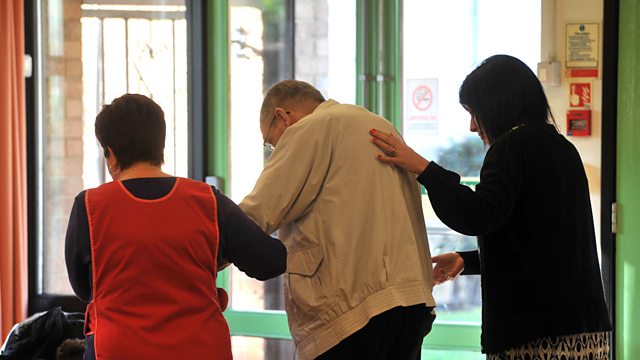Dependency
An exploration into dependency from fossil fuels to obesity and ageing populations. With historian Ian Morris, obesity expert Katarina Kos and writer David Pilling.
Bridget Kendall explores how dependency on energy affects the values we live by, how obesity and dependence on eating is reducing how long we live and whether an ageing global population could be more independent than we think. With historian and archaeologist Ian Morris, obesity and diabetes specialist Katarina Kos and journalist and writer on Asia David Pilling.
(Photo: An elderly man being helped to walk by two women. Βι¶ΉΤΌΕΔ copyright)
Last on
Chapters
-
Ian Morris
How energy capture determines attitudes to violence and inequality
Duration: 10:32
Katarina Kos
Why obesity causes fat cells to become 'overwhelmed and breathless'
Duration: 09:41
60 Second Idea
David Pilling wants to get rid of GDP and find a new measure for economic growth
Duration: 05:21
David Pilling
How Japan is responding to the challenge of an ageing population
Duration: 11:44
Ian Morris
![Ian Morris]() Professor Ian Morris is Professor of Classics at Stanford University, USA and an archaeologist. In his book Foragers, Farmers and Fossil Fuels he argues that it is dependency on energy sources that sets the limits on which kind of societies succeed and which values they adopt.
Professor Ian Morris is Professor of Classics at Stanford University, USA and an archaeologist. In his book Foragers, Farmers and Fossil Fuels he argues that it is dependency on energy sources that sets the limits on which kind of societies succeed and which values they adopt.Katarina Kos
![Katarina Kos]()
Dr. Katarina Kos is a Physician in Diabetes and Endocrinology at the University of Exeter Medical School in the UK looking at the way adipose tissue changes and responds to surplus calories, and how these changes can contribute to diabetes and heart disease. She explores our physiological, emotional and cultural dependency on calories.Β
David Pilling
![David Pilling]() David Pilling is Asia editor of the Financial Times covering business, investment, politics and economics and is author of Bending Adversity: Japan and the Art of Survival.Β He explores the impact of ageing populations in Japan and China.
David Pilling is Asia editor of the Financial Times covering business, investment, politics and economics and is author of Bending Adversity: Japan and the Art of Survival.Β He explores the impact of ageing populations in Japan and China.Sixty Second Idea to Change the World
![Sixty Second Idea to Change the World]()
Author and journalist David Pilling imagines a world without Gross Domestic Product. He argues that we are obsessed with this measure of economic growth and success and we need to find a new one. GDP only measures output and he says we should care less about production and more about income and consumption. If all growth goes to the top 1 per cent, that’s great for GDP, but the average person just feels poorer. Britain now counts heroin and prostitution as GDP and natural disasters are good for GDP with all those things to repair. Housework is invisible from GDP, so is sustainability, leisure and public transport. But is a new growth measure possible?
Broadcasts
- Mon 6 Apr 2015 01:05GMTΒι¶ΉΤΌΕΔ World Service Online
- Tue 7 Apr 2015 08:05GMTΒι¶ΉΤΌΕΔ World Service Online
Do you think political or business leaders need to be charismatic? Or do you prefer highly competent but somewhat stern people?
Podcast
-
![]()
The Forum
The programme that explains the present by exploring the past







